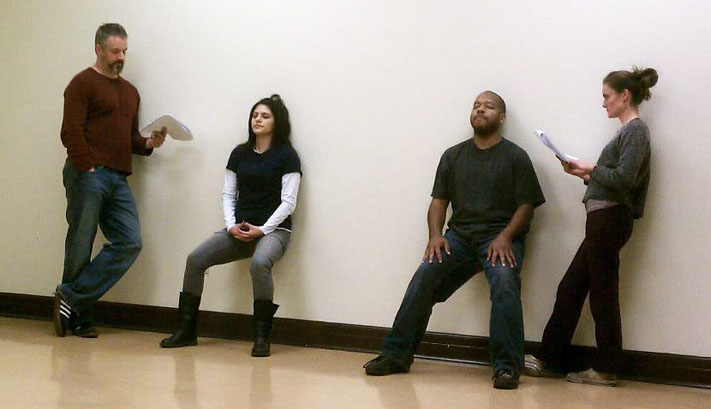The second part of Brian Astbury’s approach is what he calls “emotional release”. It is a series of physical exercises that basically get your body tired, such that your emotions are allowed to come out. Under-reading goes hand-in-hand with emotional release. You can use under-reading alone, which is why I was able to use it in auditions, but you cannot perform any emotional release exercises without under-reading. Let me explain.
Emotional Release
Your Left Brain takes care of you by giving you defenses. Defenses are unconscious reactions that protect you and your body in any given situation – from extreme emergencies to everyday encounters. They protect you from your emotions, which can often be too much to handle, by placing you in a state of fight, flight or freeze. Some common defenses: shallow breathing, tense jaws and shoulders, stiffness, strangulated voice, swallowing, crossing arms, tapping, the list is endless.
Now, if you’re an actor, defenses can be an impediment. If any emotion sets off a defense meant to protect you from said emotion, how are you, the actor, supposed to connect emotionally with your character? I wish there was a way to instruct the Left Brain that some emotions are good, really good, and you want to experience them fully. But there isn’t. So when a character’s emotions reach out from inside your core, trying to connect with your emotions and create beauty, your defenses put up a wall, slam the door and throw away the key. You, the actor, are blocked.
I am not denigrating our defenses. We need them. A really good example that Astbury provides is coping with the loss of a loved one. When the most important person in your life leaves you, or dies, a common response is to become emotionally numb for a while. Until you are ready to deal with the loss. This is your body’s way to help you survive, because if you took in all of the emotion associated with the loss right when it happens, the pain of it might just kill you.

The exercises developed by Brian Astbury over years of trial and error with acting students are a way to stop your Left Brain from creating defenses. If you’re physically exhausted, then your body cannot put up defenses. Pretty simple. Your Right Brain finds the key, unlocks the door, breaks down the wall, and your character’s emotions embrace you with warmth and understanding.
To be able to lead an actor through emotional-release exercises takes a lot of experience. I am still learning, researching and building my experience. So my attempts to lead the cast of Green Whales through these exercises was tentative, at its best. What I would like to do is teach a course in which I can explore these exercises with acting students – the most willing group of people I know.
That said, what I learned in rehearsals is that each actor has a different threshold of physical exhaustion that cannot be planned for. As a director, I need to be prepared for anything and take each actor’s experience as a completely new event.
In the next post, I talk about the Anger Run, my favorite emotional release exercise.